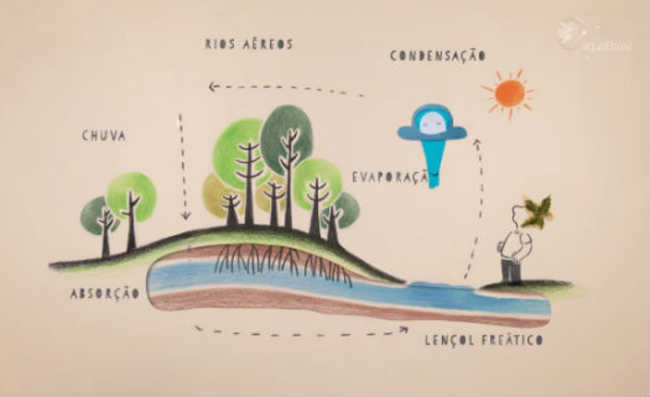What is guayusa and what is it for
Native to the equatorial Amazon region, guayusa is rich in antioxidants

DMRott edited and resized image is available on Wikimedia and licensed under CY BY-SA 4.0
Guayusa, scientific name Ilex Guayusa, is an arboreal plant native to the equatorial Amazon region. Its leaves have been known since ancient times to provide health benefits, including antioxidant and anti-inflammatory properties (see study about it here: 1).
- 16 foods that are natural anti-inflammatory
- Antioxidants: what are they and in what foods to find them
Guayusa tea has become increasingly popular. Understand what it is for and its benefits:
What is guayusa?
Guayusa trees can grow between six and 30 meters in height, producing evergreen and evergreen leaves. Although found throughout the Amazon rainforest, this species is most widely cultivated in Ecuador (see study about it here: 2).
- Amazon forest: what it is and its characteristics
- Amazon deforestation: causes and how to fight it
- What is the Legal Amazon?
Traditionally, its leaves are harvested, dried and brewed to make herbal tea. But it is also possible to find guayusa in the form of a powder and extract, which can be added to products such as energy drinks and teas. This plant has significant concentrations of caffeine and is a rich source of antioxidants and other beneficial plant compounds (see study about it here: 1).
what is it for
Although research is limited, guayusa can provide a number of health benefits.
Can improve mood and concentration
Guayusa contains caffeine, a known stimulant, offering benefits similar to those of regular coffee (see study about it here: 3).
- Caffeine: from therapeutic effects to risks
- Eight Incredible Coffee Benefits
In addition, it contains theobromine, an alkaloid structurally similar to caffeine, which can also be found in foods such as chocolate and cocoa powder (see study about it here: 4). In combination, caffeine and theobromine have been shown to increase mood, alertness, and concentration (see study about it here: 5).
A study in 20 healthy adultsfound that a mixture of caffeine (19 mg) and theobromine (250 mg) can improve brain function in the short term.
It is rich in antioxidants
Studies reveal that guayusa has several antioxidants (see the studies about it here: 2, 7, 8). These substances reduce oxidative stress by fighting free radicals. They can help reduce the risk of various chronic diseases (see study about it here: 9).
- What are free radicals?
Guayusa is particularly rich in a group of polyphenol antioxidants known as catechins, which can protect against inflammation, heart disease, cancer and type 2 diabetes (see studies about it here: 10, 11, 12, 13).
- Diabetes: what it is, types and symptoms
Can stabilize blood sugar
You can have high blood sugar if your body cannot transport sugar from your blood to your cells. If left untreated, this condition can lead to type 2 diabetes. Although the exact mechanism is uncertain, guayusa can help lower blood sugar.
In a 28-day study in non-diabetic mice, guayusa supplements were shown to significantly lower blood sugar levels, suppress appetite, and reduce body weight (see study about this: 14).
Current research is very limited and its results do not necessarily apply to humans. More human studies are needed.
Can help with weight loss
Due to its high caffeine content, guayusa can promote weight loss due to its high caffeine content.
Caffeine is a natural stimulant that helps increase metabolism, thus increasing the number of calories your body burns. Studies also reveal that it reduces appetite (see studies about it here: 15, 16, 17).
However, many of these benefits may only be short term, as the effects of caffeine seem to diminish over time (see study on this: 18). Also, most studies use extremely high doses that you wouldn't reach with a mug or two of guayusa tea. Finally, more research is needed on long-term and low-dose caffeine intake.
Side effects of drinking a lot of guayusa
In general, ingesting guayusa is very safe. In moderation, it is not associated with any adverse effects (see study about it here: 8). However, excessive doses of caffeine can cause symptoms such as restlessness, anxiety and insomnia. However, guayusa - despite its caffeine content - does not seem to cause the nervousness associated with other caffeinated beverages such as coffee (see study on this: 19)
Still, like many teas, guayusa contains tannins - compounds that can interfere with iron absorption and cause nausea, especially if consumed on an empty stomach (see studies about it here: 20, 21, 22). Tannins are likely not to be unhealthy in the low amounts found in tea, but people with iron deficiency may need to limit their intake.
How to make guayusa tea
Guayusa tea is incredibly easy to make. You can enjoy it hot or serve it chilled with ice. However, due to its caffeine content, it may be necessary to avoid consuming it before bed.
Guayusa is more likely to be found in the form of loose leaves.
To prepare this tea, add a teaspoon (about 2 grams) of loose leaves of guayusa to a mug and pour in 240 ml of boiling water. Leave on for five to seven minutes, or until you reach your desired intensity.










